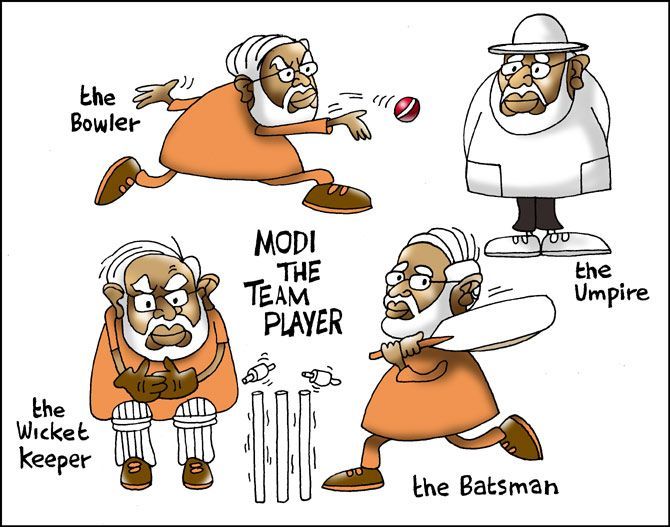'Though coalitions, which ruled India for 25 years after 1989, are regarded as a terrible thing politically, they delivered the best economic results,' points out T C A Srinivasa-Raghavan.
Illustration: Uttam Ghosh/Rediff.com

Everyone agrees that mindsets, defined as an established set of unshakeable beliefs, are dangerous things. They make you think that an opinion is valid merely because you hold it.
Everyone also agrees that British colonial rule left India with several sets of mindsets. An important one amongst these was and is that the best way for a country to arrange its politics is by means of two-party system.
According to this mindset, any departure in either direction -- a one-party system or a multi-party system -- is an aberration to be corrected.
But this is an idiotic way of seeing politics, which has clouded our judgement since 1967, when we first started to get coalitions.
A self-serving myth, fostered by the Congress party, grew subsequently that coalitions make governance harder.
So we have applauded whenever a single party is voted to power. Conversely, we have become despondent when coalitions have to be formed.
But the truth is the very opposite. Thus, though coalitions, which ruled India for 25 years after the 1989 general election, are generally regarded as a terrible thing politically, they delivered the best economic results.
India grew fastest under coalitions. The converse is also true.
The 'single party majority is the best' belief led to a huge sigh of relief when the BJP got a wafer-thin majority of 10 seats in 2014. India would now be governed properly, everyone thought.
That, alas, has not quite turned out to be the case. This is not because the BJP has governed more badly than its predecessors. It is because a simple majority is neither sufficient not necessary for ensuring good governance.
It is necessary for a leader to establish himself or herself. But it is not sufficient to guarantee good governance.
That, it would seem, depends on the countervailing power that coalition partners exert.
Hence my question: Has the time come to discard the central idea of politics which the British left behind, and start accepting that coalitions are superior to one party dominating government and Parliament and consciously work towards them?
Many countries, especially those which did not inherit a British tradition, already do so. They have done quite well or at least no worse than the ones that did.
In such countries, political parties actively work to form broad coalitions before the election.
In India, political parties do the exact opposite and form coalitions only after the election results force them to do so.
This makes no sense at all, none whatsoever from the governance point of view, because the mandate is not sufficient.
It violates transitivity wherein if A is preferred to B and B is preferred to C, it does not mean A is preferred to C.
I don't want to make heavy weather of it, folks, but the point is this: Given the way the cards are stacked at present, it is going to be extremely difficult, if not impossible, for the BJP to retain its majority in the next Lok Sabha.
This is because in 2014 just seven states gave it 185 seats out of the 282 that it won. The rest of the 22 states gave it 97.
This is a mandate in the Constitutional sense. But it is not one in the political sense.
Nonsensical as it might seem at this point, let me introduce a new idea. The people's definition of majority has changed and it now differs from the Constitutional one. This new definition is a broad range, and not a single number, 272.
The range varies from 180 to 200 seats. It is, if you will, the 'new normal'.
This, by the way, is the opposite of what is happening in the states. There, the people's definition and the Constitutional one are the same. Someone should write a PhD thesis on it.
Meanwhile, the BJP is trying to ensure that it retains and even increases its tally. That is its right and we should wish it luck.
But we do also need to ask: In order to ensure such an outcome, will a government -- any government -- be tempted to undertake misadventures that entail a huge economic and/or social cost? Would it do so if it had to deal with coalition partners?
Our recent history suggests otherwise.











